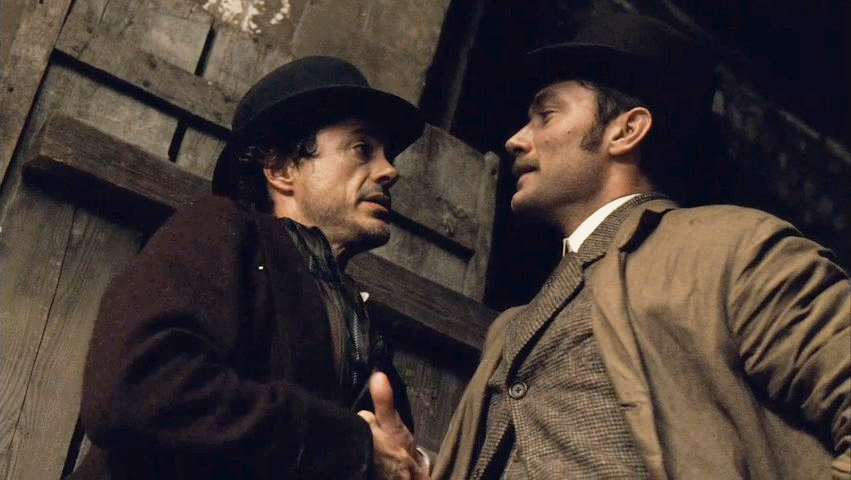Was Sherlock Holmes a racist?
The real question is of course about the racism of Sherlock Holmes's creator, Sir Arthur Conan Doyle.

A still from the 2009 film, "Sherlock Holmes" with Robert Downey Jnr. and Jude Law.
I’m obsessed with the Sherlock Holmes books. Love them all. But sometimes when I’m reading one of the little stories I go: wait hang on …that was … kind of …
Like in The Sign of Four, a thrilling tale of treasure, murder and a far away land called India. There is a small, evil Indian villain with a monkey in the story, who climbs buildings and shoots people with poison arrows through a pea-shooter. His name is Tonga; he is from the Andaman Islands and his people are described as follows:
they are naturally hideous, having large, misshapen heads, small fierce eyes and distorted features [….] They have always been a terror to shipwrecked crews, braining the survivors with their stone-headed clubs, or shooting them with their poisoned arrows. These massacres are invariably concluded by a cannibal feast.
In The Adventure of the Three Gables Holmes meets a man called Steve Dixie, a former slave:
“The door had flown open and a huge negro had burst into the room. He would have been a comic figure if he had not been terrific[…]
“I won’t ask you to sit down, for I don’t like the smell of you, but aren’t you Steve Dixie, the bruiser?”
“That’s my name, Masser Holmes, and you’ll get put through it for sure if you give me any lip.”
“It is certainly the last thing you need,” said Holmes, staring at our visitor’s hideous mouth.”
That’s some racist bullshit Holmes.
The real question is of course about Sir Arthur Conan Doyle (1849-1930), author of the Sherlock Holmes stories. He was an interesting man. It is hard to gauge his actual views of the world from his actions or even his words. I usually end up with the idea of a man who was deep-down quite impressionable, in the best sense. He was a proponent of the South African war against the Dutch (he meant Boers), but seemingly more for nationalistic reasons than anything else. He built a friendship with Oscar Wilde, but was conservative in most fundamental ways. Then, in his later years he became a proponent and fervent believer in Spiritualism and the Occult. Whatever one reads into that.
What must be remembered is of course the context and time of Doyle’s authorship. There is ample evidence of British late-victorian attitudes, also in Doyle’s other texts, for instance in The Lost World (incidentally the inspiration for Jurassic Park). As we all know, late-Victorian British aristocracy do not go down in history for their open-minded attitudes to people of other colors than white. Or other nationalities for that matter. Or other classes. Or the Irish.
Furthermore, I would say that a good deal of Doyle’s writing is actually extremely progressive for the time. For instance in The Five Orange Pips, Holmes battles it out with the Ku Klux Klan (KKK), and there is a definite tone of condemnation throughout.
The most interesting case is the story of The Yellow Face. It is, literally, an image of Frantz Fanon’s Black Skin, White Masks. A man keeps seeing a creepy, yellow, expressionless face in the neighbor’s house. He thinks it is a ghost, and suspects his wife to have something to do with it. Turns out the wife has been married before, and had a child by her first husband, a child she couldn’t leave behind when she moved from America to England. And that child …
I leave you now with the climax of The Yellow Face, and to judge Sir Arthur Conan Doyle’s work. Progressively liberal or obscurely racist?
It was a cosy, well-furnished apartment, with two candles burning upon the table and two upon the mantelpiece. In the corner, stooping over a desk, there sat what appeared to be a little girl. Her face was turned away as we entered, but we could see that she was dressed in a red frock, and that she had long white gloves on. As she whisked round to us, I gave a cry of surprise and horror.
The face which she turned towards us was of the strangest livid tint, and the features were absolutely devoid of any expression. An instant later the mystery was explained. Holmes, with a laugh, passed his hand behind the child’s ear, a mask peeled off from her countenance, and there was a little coal-black negress, with all her white teeth flashing in amusement at our amazed faces. I burst out laughing, out of sympathy with her merriment; but Grant Munro stood staring, with his hand clutching his throat.
* Image Credit: Still from the movie “Sherlock Holmes” starring Robert Downey Jnr (as Holmes) and Jude Law (as Watson). And, no, this is not about the movie.



















